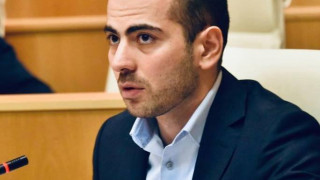On 5 February 2014, at the plenary session of the Georgian Parliament, Member of the United National Movement, Giorgi Kandelaki, criticised the speech of the Prime Minister of Georgia, Irakli Gharibashvili, given at the Munich Security Conference. Kandelaki, who also attended the abovementioned conference, declared: “At the Munich Security Conference, Mr. Gharibashvili practically disregarded the question put forward by the President of Romania and, afterwards, paraphrased by the Commissioner Füle, stressing how important it is for Georgia not to be content with the EU Association Agreement and to seek a prospect of EU membership… Gharibashvili named the regimes of Abkhazia and South Ossetia as the second parties of the conflict and not Russia, the occupant country.”
FactCheck took interest in the abovementioned statement and checked its accuracy.
On 1 February 2014, the Prime Minister of Georgia, Irakli Gharibashvili, delivered a speech at the Munich Security Conference and spoke about the relations with Russia and Georgia’s European aspirations as well as the ongoing processes in Ukraine. Gharibashvili gave a speech at the panel discussing the Eastern Partnership; the discussion was dominated by the issues concerning the ongoing processes in Ukraine. The panel discussants included the President of Romania, Traian Băsescu; Acting Foreign Minister of Ukraine, Leonid Kozhara; Leader of the Ukrainian opposition party UDAR, Vitaliy Klychko; Chairman of the Committee on CIS and Eurasian Integration of the Russian State Duma, Leonid Slutsky, and the former US National Security Advisor, Zbigniew Brzezinski. The panel was moderated by the EU Commissioner for Enlargement and European Neighbourhood Policy, Štefan Füle.
The President of Romania, Traian Băsescu, delivered a speech in which he admitted that the EU should have a “much stronger approach” towards its Eastern Partners that would enable these countries to see the prospects of EU membership. “You cannot just invite them to associate with the European Union,” he said. “This [association] does not guarantee that you would ever get accepted into the EU. So, I believe the EU should be much firmer and much stronger in creating the prospect for becoming EU members for these countries when they meet the criteria.”
The Romanian President also declared that the EU should make the issue of the frozen conflicts a priority. “This issue must be solved once and for all, because these countries themselves know that they do not have the prospect of EU membership as long as they have frozen conflicts on their territories,” Băsescu said.
Following the speech of the Romanian President, the panel moderator, European Commissioner Füle, addressed the Prime Minister of Georgia and asked about the importance of “the light at the end of the tunnel” [the prospect of EU membership] for Georgia.
The official Georgian translation of the Prime Minister’s speech was distributed by his press centre. Irakli Gharibashvili stated that the Vilnius Summit is of a historic importance and added that the Association Agreement gives wonderful opportunities to Georgia. The Prime Minister also underlined that 85% of Georgian citizens support European integration and highlighted Georgia’s aspirations towards the membership of the EU and NATO. According to Gharibashvili, this is Georgia’s historic choice based upon the common values, culture and history.
However, despite the abovementioned statement and the emphasis on Georgia’ European aspirations to become an EU member, Gharibashvili did not speak of the membership prospects for the states within the frameworks of the Eastern Partnership Programme put forward by the Romanian President and the European Commissioner for Enlargement and European Neighbourhood Policy.
The Eastern Partnership Programme foresees several directions for its partner countries in terms of the collaboration with the EU:
- The prospect of a new generation of Association Agreements;
- Integration into the EU economy with deep free trade agreements;
- Easier travel to the EU through gradual visa liberalisation, accompanied by measures to tackle illegal immigration;
- Enhanced energy security arrangements;
- Increased financial assistance;
- Deeper cooperation on environment and climate issues;
- Increased people-to-people contacts and greater involvement of civil society.








